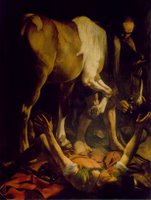Faith Seeking Understanding for January 22, 2006

Before we continue our exploration of Pope John Paul II’s Encyclical Dies Domini, we should reflect on the importance of the saints’ feast days this week. On Tuesday, January 24, the Church remembers St. Francis de Sales, bishop of Geneva and Doctor of the Church. Wednesday, January 25, is the Feast of the Conversion of St. Paul, recalling the monumental event described in Acts 9, and retold in Acts 22. St. Paul’s encounter with the Risen Christ along the road to Damascus is a crucial moment in the life of the early Church. Thursday, we celebrate the Bishops Timothy and Titus, companions of St. Paul and recipients of three “pastoral” epistles. Finally, on Saturday, January 28th, the Church remembers the Angelic Doctor, St. Thomas Aquinas.
St. Francis de Sales was born in 1567 and died in 1622 in Lyons, France. He is most famous for his preaching of the Catholic Faith during some of the most difficult years of the Protestant Reformation, and is credited for helping many Catholics to persevere in their faith and converting many Calvinists back to the Catholic Faith. Among the great legacy of teaching that he left to the Church is The Introduction to the Devout Life. Still in print, this book recalls the truth that every man, woman, and child is called to a life of holiness by God; every vocation is a path to sanctity, if only we accept the invitation from our Lord. The Introduction is one of my favorite books, and I would encourage everyone to read and benefit from its wisdom.
The great Dominican, Saint Thomas Aquinas, was born at Rocca Secca around 1225; after a life of great teaching, preaching, and manifest holiness, he died at the Abbey of Fossa Nuova in 1274, while traveling to the Council of Lyons. St. Thomas is the patron saint of Catholic universities, colleges, and schools. The Church is deeply indebted to him for his great wisdom and understanding, as well as the systematized manner in which he organized the teachings of the Church. He is most famous for the comprehensive Summa Theologica, which uses the Scholastic form of questions and objections to teach and elaborate on nearly every aspect of Catholic Theology. St. Thomas also is widely known for his commentaries on the works of Aristotle, and for using Aristotelian philosophy in analyzing the truths of the Faith.
Thankfully, St. Thomas also left marvelous homilies which are more easily understood and which remind us that St. Thomas is not a saint because he knew and understood much about Jesus Christ, but he knew and loved Jesus Christ himself. When we cultivate a deep understanding about the Catholic faith, using our God-given intellects to wrestle with the truths of Faith, we also help dispose our wills to love God more. May St. Thomas inspire us to learn more about our Faith, but also intercede for us before the heavenly throne, that in our studies and learning we would grow more deeply in the Theological virtues of faith, hope, and love.
St. Thomas always referred theology to prayer, and to real life; Pope John Paul II reminds us that “real life” always in turn refers back to Jesus Christ, in Whose image we are created, and by Whom we are redeemed. As such, he tells us in Dies Domini, 7, “The rediscovery of [Sunday] is a grace which we must implore, not only so that we may live the demands of faith to the full, but also so that we may respond concretely to the deepest human yearnings. Time given to Christ is never time lost, but is rather time gained, so that our relationships and indeed our whole life may become more profoundly human.”
May God bless you abundantly this week and always!

<< Home